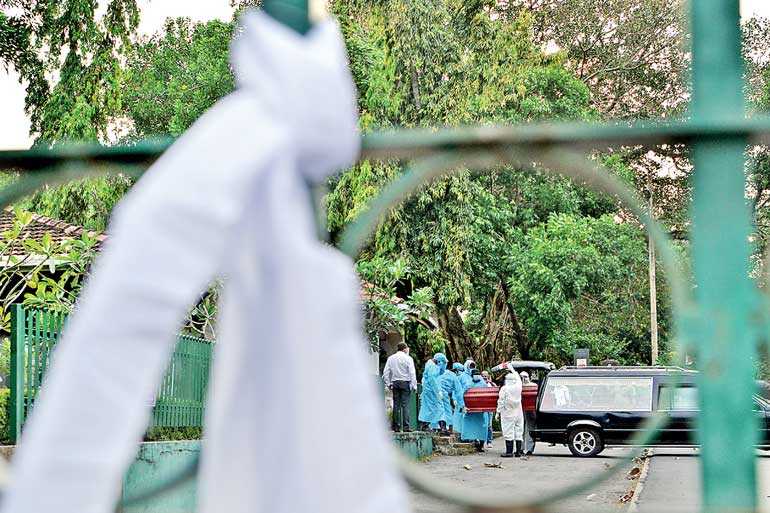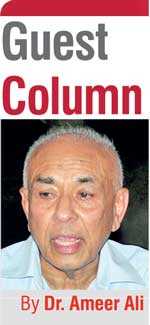Monday Feb 23, 2026
Monday Feb 23, 2026
Saturday, 2 January 2021 00:05 - - {{hitsCtrl.values.hits}}

The Muslim community, even though they did not overwhelmingly vote for him, expected not any special favours but at least justice, since GR declared that he would be a President for all Sri Lankan communities. It is this commitment that he is finding extremely hard to deliver. The Muslim burial issue is a classic case to illustrate his predicament – Pic by Shehan Gunasekara
 The new year 2021 starts with the burial issue remaining unresolved and continuing to hurt the hearts and minds of Sri Lankan Muslims. A religious tradition, observed without exception in the entire world of Islam for over fourteen and a half centuries, has been plucked away from Sri Lankan Muslims, all in the name of a piece of pseudo-science propounded by mediocre specialists and backed by a politicised sector of the Sangha and an Islamophobic think tank advising the ruling regime.
The new year 2021 starts with the burial issue remaining unresolved and continuing to hurt the hearts and minds of Sri Lankan Muslims. A religious tradition, observed without exception in the entire world of Islam for over fourteen and a half centuries, has been plucked away from Sri Lankan Muslims, all in the name of a piece of pseudo-science propounded by mediocre specialists and backed by a politicised sector of the Sangha and an Islamophobic think tank advising the ruling regime.
In spite of the horrendous impact on peoples’ lives and livelihood and on the economy, brought by COVID-19, members of this power cartel should thank the pandemic for providing them with another ‘casus belli’ to continue with their irrational hatred towards a beleaguered Muslim community.
As far as Sinhala-Buddhist-Muslim relations in Sri Lanka are concerned the year 2009 marked a turning point if not a caesura. A millennium old inter-ethnic and inter-religious harmony, integration and friendship between the two communities, which was disrupted briefly in 1915, started crumbling after that year. It was more or less a one-sided affair in which it was not the Muslims but a newly emerged group of Buddhist supremacists, who wanted to end that relationship altogether, and re-started Anagarika Dharmapala’s pre-1915 campaign that Muslims were aliens to this country and that they should be expelled to Arabia.
The truth is, Muslims of this country are so indigenised and so rooted to the soil that they owe allegiance to no other country or community in the world except Sri Lanka. That they are a segment of a universal Muslim umma is no more than an emotional attachment with their co-religionists, and has nothing to do with their undivided commitment to their mother country.
True, there were certain unsavory developments within the Muslim community especially since 1980s, which unwittingly and unnecessarily self-alienated them from the rest of Sri Lankan society, and which were exploited by Muslim leaders in the interest of their own political and selfish agenda. I have pointed out the inherent dangers of these developments and criticised the leaders’ exploitative behavior on previous occasions in this journal, and called for urgent internal reforms to avoid external attacks. As expected, those developments provided ample ammunition to the supremacists to attack the community at the slightest provocation.
Their animosity began to take a violent turn particularly since 2013, if not earlier. That violence was rationalised by a set of reasons none of which have been proved right to this day. Anyhow, those falsehoods were so rhetorically and emotionally repeated by its zealots that a gullible Sinhala Buddhist public began to believe the untruth. While this was happening, governments in power at that time never bothered to counter the supremacist campaign and present to the people, the whole truth and nothing but the truth. That silence on the part of the rulers had sinister political motives. Governments surrendered the public platform to the false prophets of Islamophobia. Anti-Muslim violence therefore became a regular occurrence since 2013.
There is no gainsaying the fact that when violence broke out in various localities, the police and army, the so-called peace keepers, just remained onlookers. Not until today did these peace keepers brought before the law any of those law breakers. Even when they brought a few, those culprits were released on orders from influential politicians. Sadly, the one-sided violence perpetrated by supremacists ultimately ended in the Easter Sunday massacre of 2019, when a few Muslim extremists took the law into their hands, engineered a suicidal mission and killed nearly 250 innocent Christian worshippers. The full story of this infamy is yet to be told. Will it be ever told?
After that horrific incident, which was unreservedly condemned by the entire Muslim community, physical harm to Muslims subsided mostly because the new President Gotabaya Rajapaksa (GR) vowed to eradicate religious extremism from the country. Whether he undertook to exterminate even the extremism of Buddhist supremacists was not made clear.
However, the Muslim community, even though they did not overwhelmingly vote for him, expected not any special favours but at least justice, since GR declared that he would be a President for all Sri Lankan communities. It is this commitment that he is finding extremely hard to deliver. The Muslim burial issue is a classic case to illustrate his predicament. He is fully aware that world opinion, including that of WHO, favours burial of the dead if families of COVID-19 victims prefer that mode of disposal. The problem for him is the hardline attitude of his Viyathmaga power cartel and politicised Buddhist clergy who insist on cremating, preferably all Muslim dead, or, at least those actually died or suspected of being dead because of COVID-19.
It is not science or epidemiological expertise that drives their hardline attitude but the One-Country-One-Law mantra to which GR is also a party. No wonder even the so-called committee of 30 experts appointed by GR to resolve this issue has adjourned its first meeting without agreement. Obviously, many of them are under pressure from the hardliners.
In the meantime, there are signs that the supremacists are looking out for some excuse to resume their violence against Muslims. The new year may witness either a repeat of 2013 Aluthgama, and possibly this time in Mawanella or a revisit of July 1983, unleashed nationwide against Muslims. In either case, one can expect the peace keepers to delay performing their duty at least for few hours if not days. The Sinhala news media has been orchestrating for some time a land dispute between Muslims and a temple at Devangala, in Mawanella. Muslims there are obviously living under fear. Recently, the same media was spreading a story about the disappearance of a few gelignite sticks from a quarry, and lately about stoning a glass enclosure that protected a Buddha statue, both in Mawanella. The media’s anti-Muslim bent in both these stories was quite clear.
Two days ago, the obstreperous Ven. Gnanasara had visited Mawanella to witness the damage to that enclosure. This man is notorious for instigating trouble wherever he went. He was there in Aluthgama in 2013 and also in Mullaitivu in 2019, besides several other trouble spots. One has to wait and see how Mawanella develops into a flash point in the new year. When that happens, it will be the regime’s new year gift to Muslims.
Is there any prospect of an anti-Muslim flare up? Aggravating economic difficulties are increasing its probability, because the regime needs a diversion to redirect the public anger that is growing daily against it. When in doubt play a trump, say bridge players. Muslims are the trump for GR-MR to play their power game. When Muslims are sacrificed there may be some empty protest from the Arab world and that would be all. Apart from that business will be as usual.
Also, the new year has witnessed another development reflecting the militarisation of the country. GR has appointed 25 Major Generals, one to each district, to take charge of controlling the pandemic virus. Is this the thin end of a wedge to militarise the entire district administration? Where is the country heading?
(The writer is attached to the School of Business and Governance, Murdoch University, Western Australia.)